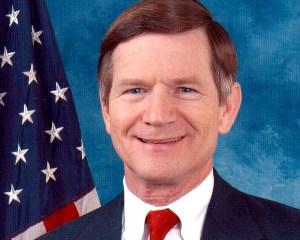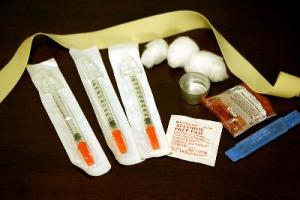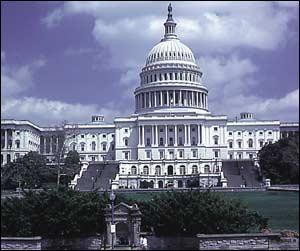If you thought the Obama administration was friendly to medical marijuana, think again. Federal prosecutors in California have just declared war, with the okay from Washington.
Every day that passes without criminal justice reform is a day that thousands who don't need to be in prison, and may have never deserved to go there, languish needlessly. Please ask your US Representative and your two US Senators to pass the National Criminal Justice Commission Act.
Every two years drug policy reformers from across the United States and around the world come to the International Drug Policy Reform Conference to listen, learn, network and strategize together for change. This year the conference is in Los Angeles, in November, and StoptheDrugWar.org is a partner.
The Zeta-Killers continue to stay busy in Veracruz, and mass killings continue across the land.
There's a bumper crop of Afghan opium this year.
Rep. Lamar Smith (R-TX) is pushing a bill that could criminalize your at home planning for that coffee shop tour of Amsterdam -- and much more.
A Southern California federal prosecutor has signaled that the Justice Department's war on medical marijuana distribution will be extended to media that accept advertising from dispensaries.
California Gov. Jerry Brown has signed into law a pair of bills that will expand syringe access and help slow the spread of infectious diseases.
California Gov. Jerry Brown has vetoed a hemp bill, calling the federal ban on hemp production "absurd" as he did so. But that didn't mollify industry groups.
Supreme Court Justice Antonin Scalia had a few choice words about the reach of federal drug laws this week.
The RAND Corporation has been caught in a political buzz saw since it dared to claim that medical marijuana dispensaries didn't cause crime to increase. Now, it has pulled those research results pending further review.
A young Rhode Island man has drowned while attempting to flee a Massachusetts pot bust. He's the 39th person to die in US domestic drug law enforcement operations so far this year.
Dirty cops popped up all across the South this week, and a crooked California prison guard, too.
Signaling an intensification of federal government targeting of medical marijuana providers, the four US Attorneys in California last Friday announced a campaign of "coordinated enforcement actions targeting the illegal operations of the commercial marijuana industry in California." The announcement came at a Sacramento news conference.
The federal prosecutors said their enforcement actions would rely on pursuing civil forfeiture lawsuits against properties where dispensaries are located, sending threatening letters to dispensary landlords, and criminal prosecutions. The prosecutors said recent dispensary busts in Fresno, Los Angeles, Sacramento and San Diego were part of the enforcement campaign.
The feds said that enforcement actions would vary across regions of the state and that they would be working with federal law enforcement and local officials to crack down. The Department of Justice in Washington made clear that this was not an instance of prosecutors going off the reservation.
"The actions taken today in California by our US Attorneys and their law enforcement partners are consistent with the Department's commitment to enforcing existing federal laws, including the Controlled Substances Act (CSA), in all states," said Deputy Attorney General James Cole. "The department has maintained that we will not focus our investigative and prosecutorial resources on individual patients with serious illnesses like cancer or their immediate caregivers. However, US Attorneys continue to have the authority to prosecute significant violations of the CSA, and related federal laws."
Medical marijuana supporters were quick to charge the Obama administration with waging a renewed war on them and reneging on its promises to not interfere in states where medical marijuana is legal.
"Aggressive tactics like these are a completely inappropriate use of prosecutorial discretion by the Obama administration," said Joe
Elford, chief counsel with
Americans for Safe Access (
ASA), the country's largest medical marijuana advocacy group. "President Obama must answer for his contradictory policy on medical marijuana." On the campaign trail and in the White House, President Obama pledged that he was "not going to be using Justice Department resources to try to circumvent state [medical marijuana] laws."
"It is unconscionable that the federal government would override local and state laws to enforce its will over the will of the people," said
ASA spokesperson Kris Hermes. "States must be allowed to enforce their own laws without harmful interference from the Obama administration."
"The Obama administration's latest moves strongly suggest that their medical marijuana policies are now being driven by overzealous prosecutors and the anti-marijuana ideologues who dominated policymaking in past administrations," said Ethan
Nadelmann, executive director of the
Drug Policy Alliance. "Barack Obama is betraying promises made when he ran for president and turning his back on the sensible policies announced during his first year in office. Instead of encouraging state and local authorities to regulate medical marijuana distribution in the interests of public safety and health, his administration seems determined to
recriminalize as much as possible. It all adds up to bad policy, bad politics and bad faith."
Large medical marijuana dispensary operations are not health care providers but criminal organizations hiding behind patients, the prosecutors claimed Friday.
"Large commercial operations cloak their moneymaking activities in the guise of helping sick people when in fact they are helping themselves," said Benjamin Wagner, US Attorney for the Eastern District of California. "Our interest is in enforcing federal criminal law, not prosecuting seriously sick people and those who are caring for them. We are making these announcements together today so that the message is absolutely clear that commercial marijuana operations are illegal under federal law, and that we will enforce federal law."
"The California marijuana industry is not about providing medicine to the sick," claimed Laura Duffy, US Attorney for the Southern District of California. "It's a pervasive for-profit industry that violates federal law. In addition to damaging our environment, this industry is creating significant negative consequences, in California and throughout the nation. As the number one marijuana producing state in the country, California is exporting not just marijuana but all the serious repercussions that come with it, including significant public safety issues and perhaps irreparable harm to our youth."
The prosecutors said they had sent out "dozens" of threat letters to dispensary and grow-op landlords in the past few days. In the Southern and Eastern districts, they targeted building owners, while in the Central district they sent letters to landlords "in selected cities where officials have requested federal assistance." In the Northern district, they targeted their threat letters to landlords of dispensaries within 1,000 feet of schools or parks, but warned "we will almost certainly be taking action against others."
The prosecutors also said they had already filed seven civil forfeiture complaints against properties where landlords allow dispensaries to operate. One complaint alleged that an Orange County strip mall had eight dispensaries and that recalcitrant city officials had spent hundreds of thousands of dollars trying to shut them down.
One letter targeted the landlord for the Marin Alliance for Medical Marijuana (
MAMM) in Fairfax, which has been operating with the support of the city and without complaint since 1996. In a letter to
MAMM's landlord, the US Attorney for Northern California warned that the dispensary was operating within a "prohibited distance of a park." The letter threatened
MAMM's landlord with up to 40 years in federal prison, seizure of his property, and forfeiture of all rental proceeds for the last 15 years if he doesn't evict
MAMM.
Similar letters have gone out to other dispensary landlords warning them of pending federal action because their tenants are too close to schools. The dispensaries are operating in accord with California law, which treats them like liquor stores and bars them from operating within 600 feet of a school, but federal law imposes additional penalties for the distribution of controlled substances with 1,000 feet of schools, playgrounds, and public parks.
"This is nuts," said Greg Anton, attorney for the Marin Alliance and its director, Lynnette Shaw. "There's a dispensary near where I live that sells guns, narcotics, alcohol and tobacco and it's full of children. It's called Walmart, and it's safe. So is Lynnette's place. She's proven that over 15 years."
"This is an outrageous abuse of law enforcement resources for the DOJ to use property forfeiture to enforce meddlesome, nanny-state regulations," said
California NORML director Dale
Gieringer. "The federal government has no business dictating local zoning decisions. No one has any problems with the Marin Alliance except the bureaucrats in Washington."
The DEA is also along for the ride. "The DEA and our partners are committed to attacking large-scale drug trafficking organizations, including those that attempt to use state or local law to shield their illicit activities from federal law enforcement and prosecution," said DEA Administrator Michele
Leonhart. "Congress has determined that marijuana is a dangerous drug and that its distribution and sale is a serious crime. It also provides a significant source of revenue for violent gangs and drug organizations. The DEA will not look the other way while these criminal organizations conduct their illicit schemes under the false pretense of legitimate business."
And so is the IRS. "IRS Criminal Investigation is proud to work with our law enforcement partners and lend its financial expertise to this effort," said IRS chief of criminal enforcement Victor Song. "We will continue to use the federal asset forfeiture laws to take the profits from criminal enterprises."
Friday's announcement of a federal crackdown is just the latest in a series of moves against medical marijuana providers by the Obama administration. The Department of the Treasury has been busily scaring banks into shutting down the accounts of providers in California and Colorado, the Department of Justice is aggressively prosecuting dispensary operators in Montana and elsewhere, and the IRS is attempting to drive dispensaries out of business by denying them standard business expense deductions -- Oakland's
Harborside Health center was just this week hit with a $2.5 million tax bill after the IRS disallowed its standard business deductions.
Meanwhile, the administration has continued to block federal approval of medical marijuana, with the DEA recently rejecting a nine-year-old petition to reschedule pot, saying it would only accept large-scale, controlled FDA trials. But at the same time, the DEA has acted to block such trials by refusing to allow a private production facility to supply marijuana for medical research. The only existing source for marijuana for research purposes is the National Institutes on Drug Abuse, but it recently blocked a request for marijuana to study its effects on Post-Traumatic Stress Disorder, saying it has no intention of allowing studies that would develop marijuana for medicinal purposes.
"How can the Obama administration say that it's fine for sick people to use this proven medicine, and yet tell them they can't have any legal place to get it?" asked Rob
Kampia, executive director of the
Marijuana Policy Project. "Medical marijuana isn't going away. Over 70% of Americans support making medical marijuana legal, and 16 states allow it."
But not the federal government. Not under George Bush and, it is increasingly clear, not under Barack Obama. With Obama facing no challengers in the Democratic primary and with reform-friendly Republicans unlikely to win the Republican nomination, it appears that medical marijuana is going to be condemned to wander through the political wilderness for the foreseeable future.
The question now becomes whether any sort of response can stem the federal onslaught, and just what that response might be. Or does the dispensary scene just wither away and die?
back to top
Sen. Jim Webb (D-VA) has reintroduced the
National Criminal Justice Commission Act,
legisation to "create a blue-ribbon commission to look at every aspect of our criminal justice system with an eye toward reshaping the criminal justice system from top to bottom." The
NCJCA, S. 306 in the current Congress, had broad and bipartisan support and passed the House of Representatives in 2010, but did not make the Senate calendar before the end of the year.
Please use our web form to urge your US Representative and your two US Senators to pass S. 306 so the commission can get started! Please follow-up by calling their offices too -- if you don't know their numbers (or aren't sure who they are), you can reach them by calling the Congressional Switchboard at (202) 224-3121. And please use our tell-a-friend form to spread the word.
The need for S. 306 is urgent. As Sen. Webb's web site notes:
- With 5% of the world's population, our country now houses 25% of the world's reported prisoners.
- The number of incarcerated drug offenders has soared 1200% since 1980.
- Four times as many mentally ill people are in prisons than in mental health hospitals.
- Approximately 1 million gang members reside in the US, many of them foreign-based, and Mexican cartels operate in 230+ communities across the country.
- Post-incarceration re-entry programs are haphazard and often nonexistent, undermining public safety and making it extremely difficult for ex-offenders to become full, contributing members of society.
Every day that passes without criminal justice reform is a day that thousands of people who don't need to be in prison, who may have never deserved to go there, continue to languish needlessly behind bars, separated from their friends and families who want them back. Thank you for taking action.
back to top
StoptheDrugWar.org (
DRCNet) is pleased to be a partner in the upcoming
2011 International Drug Policy Reform Conference, this November 2-5 at the Westin Bonaventure in Los Angeles.
The Reform Conference, sponsored by our friends at the
Drug Policy Alliance, is the major biennial gathering of drug policy reformers of all kinds. The last one, held in Albuquerque in 2009, brought together over 1,000 attendees representing 30 different countries. This year attendees will have the opportunity to spend three days interacting with people committed to finding alternatives to the war on drugs while participating in sessions given by leading experts from around the world.
Click here to register -- early bird rates are available through September 16, and discounts are available for students.
Some testimonials from the 2009 conference:
"You leave the conference inspired and informed. Meeting this crowd of wise, energetic kindred spirits recharges your reform batteries."
--Michael Jourdan, Centre of Alcohol and Drug Research, Copenhagen, Denmark
"This is the only conference that combines X-treme intelligence, passion, and practical applications. It is the best I ever attend."
--Patt Denning, Harm Reduction Therapy Center, San Francisco, California
"A living breathing think tank of like minds, crafting out solutions that keep people's dignity and human rights intact."
--Waheedah Sahabzz-El, Community HIV / AIDS Mobilization Project, Philadelphia, Pennsylvania
"This conference provided a new beginning for me, I now have a true passion for DPR."
--Susanne Widmer, Albuquerque, New Mexico
"The Reform Conference gave me the courage to return to my Canadian community and give voice to the common sense of Drug Policy Reform. The experience provided me with the evidence, language and tools to be a credible, educated leader in changing the way we approach the issue of substance use in our community."
--Patty Hajdu, Thunder Bay District Health Unit, Thunder Bay, Ontario, Canada
Hope to see you there.
back to top
by Bernd Debusmann Jr.
Mexican drug trafficking organizations make billions each year smuggling drugs into the United States, profiting enormously from the prohibitionist drug policies of the US government. Since Mexican president Felipe Calderon took office in December 2006 and called the armed forces into the fight against the so-called cartels, prohibition-related violence has killed around 40,000 people, including more than 15,000 last year. The increasing militarization of the drug war and the arrest or killing of dozens of high-profile drug traffickers have failed to stem the flow of drugs -- or the violence -- whatsoever. The Merida initiative, which provides $1.4 billion over three years for the US to assist the Mexican government with training, equipment and intelligence, has so far failed to make a difference. Here are a few of the latest developments in Mexico's drug war:
Wednesday, October 5
In
Culiacan,
Sinaloa,
a top Sinaloa cartel leader was arrested without incident. Noel
Salguiero Navarez, "El
Flaco Salguiero," was the head of La
Gente Nueva, which is considered the armed wing of the
Sinaloa Cartel operating in Chihuahua and several other states. He is also thought to have been leading the
Sinaloa Cartel's push to take
Ciudad Juarez.
Thursday, October 6
In Veracruz
, 32 bodies were discovered at three locations. The discovery came after Marines took eight members of the
Jalisco New Generation Cartel prisoner, who then led them to the locations. The government alleges that these men, who call themselves Zeta-Killers, are also responsible for the 35 bodies found on September 20.
Additionally, 12 members of the
Zetas were captured, including
Aguiles Amaranto Cruz
Hurtano, the Zeta boss for the Veracruz region.
Friday, October 7In Veracruz, Attorney General Reynaldo Esperez Perez resigned his office in the area. Escobar Perez was in office for only seven months. He is to be replaced by his deputy.
Near Monterrey, authorities announced that several police officers are being detained for allowing kidnap victims to be housed by their kidnappers in a local jail while negotiations were taking place. The hostages were rescued earlier in the week. The officers are thought to have been working for the Zetas.
Saturday, October 8
In Veracruz, 10 more bodies were discovered. Seven of the dead were discovered in the bed of a truck and the other three were found on roadsides in two different locations.
In Linares, Nuevo Leon, the entire police force of over 100 men was taken into custody for possible corruption and ties to drug trafficking groups. They were all driven out of the town on buses while the investigation continues. Mexican soldiers and federal police will take over policing duties in the town.
In Ciudad Juarez, at least seven people were killed. Among the dead were three men who were gunned down in the parking lot of a store in front of dozens of horrified witnesses.
Sunday, October 9
In Zacatecas, six police officers were killed in an ambush. The policemen were returning to the city of Valparaiso from a party when they were intercepted by a group of men wielding assault rifles and hand grenades.
In Ciudad Juarez, at least seven people were murdered in four separate incidents. In one incident, two boys, aged 16 and 17, were gunned down inside a home in the El Papolote area of the city. Later that afternoon, three men were killed inside a home in the Fray Garcia de San Francisco area.
Tuesday, October 11
In Mexico City, the Navy announced that 11 cartel members were killed and 36 captured during five days of raids in several parts of Tamaulipas. Additionally, four tons of marijuana was seized from two locations and 251 grenades were confiscated. Among those captured was the Gulf Cartel chief for the city of Miguel Aleman.
In downtown Monterrey, three men were shot and killed in separate incidents. In one incident, a 51-one year old man was shot and killed with an AK-47 after his car was intercepted by unknown gunmen.
Wednesday, October 12
In Reynosa, authorities discovered the body of the Gulf Cartel’s main financial operator. Cesar Davila Garcia, "El Gama" had had apparently been killed by unknown parties with a 9 mm handgun that was found at the scene. At one point, Davila Garcia had been the personal accountant of former Gulf Cartel leader Ezequiel Cardenas-Guillen, "Tony Tormenta," before his death in November 2010. He was briefly given control of the Tampico region before being sent to Reynosa to assume his duties as the cartel's main financial operator
[Editor's Note: We can no longer tally this year's drug war deaths in Mexico with any degree of accuracy. The figure for this year's deaths is an estimate, no more, until there is some official toll.]
Total Body Count for 2007 (approx.): 4,300
Total Body Count for 2008 (approx.): 5,400
Total Body Count for 2009 (approx.): 9,600
Total Body Count for 2010 (official): 15,273
Total Body Count for 2011: (approx.): 7,800
TOTAL: > 42,000
back to top
The amount of opium produced in Afghanistan this year has increased dramatically, the UN Office on Drugs and Crime (UNODC) said in a report Tuesday. Production is up 61% over last year, according to the 2011 Afghan Opium Survey jointly released by UNODC and the Afghan Ministry of Counter Narcotics.

Afghan opium eradication poster. Apparently, no one is paying attention. (wikimedia.org)
The report comes as the US marks the 10
th anniversary of its invasion of Afghanistan in October 2001. Since the US invasion, Afghanistan has been the world's leading opium producer, as US and NATO forces largely ignore poppy planting, favoring counterinsurgency over counter narcotics.
Production declined dramatically last year owing primarily to a blight that struck opium poppies. But this year, poppy was back with a bang. Not only did opium production increase dramatically, but the amount of land sown with poppy also increased, although not so dramatically. The number of hectares under poppy production increased from 120,000 last year to 131,000 this year, up 7%. That was to be expected after last year's blight caused raw opium prices to soar.
UNODC estimated the farm gate value of the poppy crop at $1.4 billion or about 9% of Afghanistan's gross domestic product. But when heroin processing and trafficking is added to the mix, poppy takes on an even greater role in the national economy, contributing to something between one-third and one-half of all economic activity.
UNODC estimated that the Taliban receives 10% of poppy harvest proceeds, or around $140 million a year. But that figure is even larger when Taliban taxation of or involvement in opium and heroin trafficking is taken into account.
Poppy production is centered in areas that are largely outside the control of the government in Kabul. The Taliban bastions of Helmand and Kandahar provinces accounted for the majority of Afghan opium production, with production also booming in conflictive
Nangahar province along the Pakistan border in eastern Afghanistan.
This year's estimated 5,800 metric tons of opium production, while a large increase over last year, is still below Afghanistan's peak production. In 2006 through 2009, production was over 6,000 metric tons each year, reaching nearly 8,0000 metric tons in 2007. Still, Afghanistan's position as the world's leading opium producer remains unchallenged, and it accounts for more than 80% of global opium production.
back to top
A bill that would allow federal prosecutors to charge people in the US with Controlled Substances Act violations for planning activities outside the US that violate US drug laws -- even if those acts are legal in the country where they take place -- has passed the House Judiciary Committee. The committee approved the measure, HR 313, the Drug Trafficking Safe Harbor Elimination Act, on a 20-7 vote last Thursday.

Lamar Smith
The bill is the brainchild of committee chair Rep. Lamar Smith (R-TX), who said in a
statement that it was designed to close a "loophole" in US drug laws. "Drug traffickers are currently allowed to conspire with impunity in the United States and evade criminal prosecution when their goal is to traffic drugs outside of the United States," he said.
He cited the case of a cocaine trafficking conspiracy involving drugs shipped from Venezuela to Europe in which some meetings took place in Miami. The 11
th US Circuit Court of Appeals overturned convictions in the case, reasoning that if there was no intent to traffic drugs in the US, there was no violation of US law.
"This bill tells drug traffickers not to plot their illegal activities in the US, and if they do, they will be brought to justice," said Smith. "The United States should not provide a safe haven for the world's drug traffickers to plot their international trafficking operations."
But, as Bill Piper of the
Drug Policy Alliance noted, the bill is written so broadly that it could criminalize any violation of US drug laws if that violation is planned in the US. For instance, heroin maintenance therapy is illegal under US drug laws. As the law is written, a US health care professional who made plans to work with colleagues doing heroin maintenance in a country where it is legal could potentially face prosecution.
"Under this bill, if a young couple plans a wedding in Amsterdam, and as part of the wedding, they plan to buy the bridal party some marijuana, they would be subject to prosecution, Piper told the
Huffington Post. "The strange thing is that the purchase of and smoking the marijuana while you're there wouldn't be illegal. But this law would make planning the wedding from the US a federal crime."
While the bill has passed the Judiciary Committee, it still must pass the House Energy and Commerce Committee, where it is currently bottled up in the Subcommittee on Health, before it can go to a House floor vote.
back to top
The Justice Department's revived offensive against medical marijuana distribution is expanding to include media outlets that advertise for dispensaries, a California US Attorney told California Watch in an interview this week.

2010 New York Times article about medical marijuana advertising
Last week, the state's four US Attorneys held a joint news conference in Sacramento to announce they were targeting dispensary landlords and property owners, as well as going after dispensaries that violated the prosecutors' idea of what was permissible. Those included dispensaries located within a thousand feet or schools or parks (a federal -- not state -- sentencing enhancement) and dispensaries that did too much business -- more than 200 kilograms in a year.
Now, radio, TV, print, and electronic media are to be added to the list of those threatened by the feds. Laura Duffy, US Attorney for Southern California, said medical marijuana advertising is the next area she will be "going to be moving onto as part of the enforcement efforts in Southern California."
Federal law prohibits advertising illegal drugs. Although medical marijuana is legal under California law, the federal government stands firm in its contention that marijuana is illegal -- period.
"I'm not just seeing print advertising," Duffy said. "I'm actually hearing radio and seeing TV advertising. It's gone mainstream. Not only is it inappropriate -- one has to wonder what kind of message we're sending to our children -- it's against the law."
Duffy said she would first be "going after these folks with... notification that they are in violation of federal law." She also none too subtly mentioned that she has the power to seize properties.
Federal law targets anyone who "places" an ad for an illegal drug -- not the media owner -- but Duffy said she was taking an expansive view of the law. "If I own a newspaper... or I own a TV station, and I'm going to take in your money to place these ads, I'm the person who is placing these ads," Duffy said. "I am willing to read (the law) expansively and if a court wants to more narrowly define it, that would be up to the court."
First Amendment, meet the war on drugs.
back to top
California Gov. Jerry Brown (D) has signed into law a pair of bills that will expand access to clean needles and help prevent the spread of HIV and Hepatitis C infections in the state. The move is winning him kudos from drug reformers and public health advocates.

Badly needed needle exchanges could be coming to more CA counties under a bill just signed by Gov Brown. (wikimedia.org)
The first bill,
Senate Bill 41, sponsored by Sen. Leland Yee (D-San Francisco), makes legal the sale of syringes at pharmacies without a prescription. An earlier pilot program allowing such sales had been in effect in some counties and has proven effective at reducing needle-sharing, but most counties did not participate. Now, once the bill goes into effect on January 1, people will be able to buy syringes without a prescription at pharmacies statewide.
The second bill,
AB 604, sponsored by
Assemblywoman Nancy Skinner (D-Berkeley), allows the California Department of Public Health to authorize new needle exchange programs after consultation with local public health and law enforcement. Currently, needle exchange programs are only authorized after county officials declare a public health emergency, and the political will to do that has been lacking in some counties. This bill allows public health officials to take the initiative instead of waiting for elected officials. It, too, will go into effect on January 1.
"I am directing the department to administer AB 604 in a constrained way, working closely not only with local health officers and police chiefs, but with neighborhood associations as well," said
Gov. Brown in his signing statement. "I believe that AB 604 can reduce the spread of communicable diseases and the suffering they cause and, at the same time, respect public safety and local preference."
"This is a huge victory for public health and common sense," said Laura Thomas, Deputy Director of California for the
Drug Policy Alliance. "Now all Californians will have the same access to proven, effective HIV and hepatitis C prevention. This gives drug users the tools that they need to protect their health and that of their partners, children, and communities, as well as protecting the California taxpayer from the cost of HIV and hepatitis C infections."
back to top
California Gov. Jerry Brown (D) has vetoed a bill that would have allowed farmers in select counties to grow hemp, saying it would subject them to federal prosecution, but in doing so, he lashed out at the federal ban on hemp farming in the US, calling it "absurd."

hemp field at sunrise (votehemp.com)
Sponsored by Sen. Mark Leno (D-San Francisco), the bill,
Senate Bill 676, would have allowed farmers in four Central California counties to grow industrial hemp for the legal sale of hemp seed, oil, and fiber to manufacturers. The bill specified that hemp must contain less than 0.3% THC, the primary psychoactive ingredient in cannabis, and farmers would have to submit their crops to testing before they go to market.
The bill had mandated an eight-year pilot program that would end in 2020, but not before the California attorney general would issue a report on law enforcement impact and the
Hemp Industries Association would issue a report on its economic impact.
But although, like three other hemp bills that have been vetoed in California in the past decade, the bill passed the legislature and had the broadest support of any hemp measure considered in the state,
Gov. Brown killed it, citing the federal proscription on hemp farming.
"Federal law clearly establishes that all cannabis plants, including industrial hemp, are marijuana, which is a federally regulated controlled substance," Brown said in his
veto message. "Failure to obtain a permit from the US Drug Enforcement Administration prior to growing such plants will subject a California farmer to prosecution," he noted.
"Although I am not signing this measure, I do support a change in federal law," Brown continued. "Products made from hemp -- clothes, food, and bath products -- are legally sold in California every day. It is absurd that hemp is being imported into the state, but our farmers cannot grow it."
Industry groups were not assuaged by Brown's language criticizing the federal hemp ban. In a
press release Monday,
Vote Hemp and the Hemp Industries Association blasted the veto.
"Vote Hemp and The Hemp Industries Association are extremely disappointed by
Gov. Brown's veto. This is a big setback for not only the hemp industry -- but for farmers, businesses, consumers and the California economy as a whole. Hemp is a versatile cash and rotation crop with steadily rising sales as a natural, renewable food and body care ingredient. It's a shame that
Gov. Brown agreed that the ban on hemp farming was absurd and yet chose to block a broadly supported effort to add California to the growing list of states that are demanding the return of US hemp farming. There truly was overwhelming bipartisan support for this bill," said Eric
Steenstra, president of Vote Hemp and executive director of the
HIA.
"After four vetoes in ten years in California, it is clear we lack a governor willing to lead on this important ecological, agricultural and economic issue. We will regroup, strategize and use this veto to our advantage at the federal level," added Vote Hemp Director and co-counsel Patrick
Goggin.
The US hemp market is now estimated to be about $420 million in annual retail sales, but manufacturers must turn to foreign suppliers because the DEA, which refuses to differentiate between industrial hemp and recreational and medical marijuana, bars its cultivation here.
back to top
In an unusual hearing at the Senate Judiciary Committee October 5, Supreme Court Justice Antonin Scalia criticized the expansion of federal drugs laws, saying the large number of federal drug cases necessitated an expansion of the federal judiciary that had diluted its quality.

Justice Scalia (
"It was a great mistake to put routine drug offenses into the federal courts," he told the committee, adding that routine drug cases belong in state courts, where the vast majority of criminal cases are heard.
That got words of agreement from committee chairman Sen. Patrick Leahy (D-VT), a former state prosecutor himself.
Scalia's comments came at a hearing in which he and Justice Stephen
Breyer discussed with senators the judiciary's role in the US constitutional system. The expansion of federal crimes, including federal drug prosecutions, threatened the "elite" nature of the federal judiciary, Scalia said.
Appointed to the Supreme Court by President Ronald Reagan in 1986, Scalia is the longest-serving justice. He has been described as the intellectual anchor of the court's conservative wing. While not generally friendly to criminal defendants -- he is a staunch defender of the death penalty and a critic of Miranda -- he has defended the right of drug defendants to confront the evidence against them by forcing lab techs to testify and he authored the majority opinion holding that warrantless infrared searches violated the Fourth Amendment. He was also a key figure in the court's
Apprendi,
Blakely and Booker rulings which led to federal sentencing guidelines being declared advisory rather than mandatory.
back to top
In the face of withering criticism from local law enforcement officials, the RAND Corporation has removed from its web site, at least temporarily pending review, a September study that found that crime increased when medical marijuana dispensaries closed down. That study concluded that there is "no evidence that medical marijuana dispensaries in general cause crime to rise."
The study was subject to
immediate attack from local officials, particularly from avowed medical marijuana foe LA County District Attorney Carmen
Trutanich and from the LA city attorney's office.
Trutanich called the study's results "highly suspect and unreliable" and claimed they were based on "faulty assumptions, conjecture, conjecture, irrelevant data, untested measurements and incomplete results."
Special Assistant City Attorney Jane Usher and Assistant City Attorney
Asha Greenberg, whose office argued in court that dispensaries bred crime when successfully seeking to limit their numbers, added to the pressure on RAND. "Until you publicly retract your work, we expect the RAND publication to be referenced nationwide, at incalculable avoidable harm to public health and safety," they hyperbolically wrote.
The RAND study examined crime reports for 10 days before and 10 days after the city ordered more than 70% of the city's 638 dispensaries to close in June 2010. The researchers analyzed crime reports in neighborhoods where dispensaries had closed and compared them to neighborhoods where dispensaries stayed open.
RAND bent to the pressure this week. "We took a fresh look at the study based in part upon questions raised by some folks following publication, RAND spokesman Warren
Robak told
Toke of the Town. "The LA City Attorney's Office has been the organization most vocal in its criticism of the study."
The study has been taken down for review, but not retracted,
Robak clarified. "I don't have an estimate of when the review will be complete and the study will reappear," he said.
Americans for Safe Access, the nation's largest medical marijuana advocacy group, decried the intrusion of politics into the realm of science and urged RAND to stand its ground. "When will objective science on medical marijuana be honestly and thoroughly considered without the intrusion and constraints of politics?" the group asked. "As a decades-old institution, RAND should stand by its research and not buckle to political pressure."
back to top
[Editor's Note: Drug War Chronicle is trying to track every death directly attributable to domestic drug law enforcement during the year. We can use your help. If you come across a news account of a killing or death related to drug law enforcement, please send us an email at [email protected].]

The Merrimack River at Lowell, Massachusetts (wikimedia.org)
A Coventry, Rhode Island man arrested on marijuana distribution charges by Lowell, Massachusetts, police died Friday when he jumped into the
Merrimack River wearing handcuffs and drowned while attempting to flee. Luke Hammond, 23, becomes
the 39th person to die in US domestic drug law enforcement operations so far this year.
According to the
Boston Herald, Hammond had been pulled over and arrested Friday evening on charges of possession of marijuana with intent to distribute and driving without a license. While officers waited for a police van to take him to jail, Hammond, who was already handcuffed, broke free and sprinted about 100 yards before leaping into the river.
Lowell Fire Department scuba divers found Hammond's body in the water about 45 minutes after he jumped in the river. He was taken to Lowell General Hospital where he was pronounced dead.
"When he was found, he only had one hand in the cuffs," said
Capt. Randall Humphrey, a Lowell Police Department spokesman. "He was in custody (at the time of his escape). He had been handcuffed and somehow was able to get one of his hands out. I would say he jumped into the river intentionally. I don't think he tripped and fell in," Humphrey said.
back to top
Dirty cops popped up all across the South this week, and a crooked California prison guard, too. Let's get to it:
In Helena, Arkansas,
five Helena-West Helena police officers were arrested Tuesday as part of a major drug trafficking crackdown that also involved public corruption. More than 800 federal and local police took part in mass arrests that targeted 70 people on federal charges. The police action, code named Operation Delta Blues, targeted crack cocaine sale and money laundering, but also swept up the Helena-West Helena police on corruption charges. The officers arrested are Helena-West Helena Police Department officer Herman Eaton, 46; Helena-West Helena officer Robert "Bam Bam" Rogers, 35; Helena-West Helena
Sgt. Marlene
Kalb, 48;
Marvell police officer Robert
Wahls, 42; and former Phillips County Deputy Sheriff Winston Dean Jackson, 44, who's now a Helena-West Helena police officer. They face a variety of drug trafficking and other charges.
In
Caruthersville, Missouri,
the Caruthersville police chief and an officer were arrested October 6 and charged with forgery and theft. Chief Chris Riggs and Officer Marcus Hopkins each face multiple counts of forgery, while Riggs also faces one count of theft. Their exact misdeeds have not been revealed, but the investigation was conducted by the Missouri Highway Patrol Drugs and Crime Division. Both men are free on $200,000 bonds. Riggs remains police chief.
In Bayou La
Batre, Alabama,
a former Bayou La Batre police officer was arrested October 7 after a months-long investigation into missing drug money by the Alabama Bureau of Investigation. Former officer Jason Edwards had been in charge of confiscated drug money when some turned up missing in March. He resigned over the summer. At last report, Edwards was out on bail pending trial.
In St.
Martinsville, Louisiana,
a St. Martin Parish Sheriff's Office jail guard was arrested October 5 for allegedly smuggling contraband into the St. Martin Parish Correctional II Facility. Officer Freddie Abraham, 20, is charged with malfeasance in office, criminal conspiracy, attempted introduction of contraband in penal institutions, and possession with intent to distribute marijuana. He was last reported in jail trying to make a $30,000 bond.
In Blacksburg, South Carolina,
a former Cherokee County sheriff's department narcotics officer was arrested October 5 for engaging in sex acts with a confidential informant who had pending charges. Albert Phillips, 41, is charged with misconduct in office for the acts, which took place between December 2008 and January 2009. He resigned in January 2009.
In
Petaluma, California,
a guard at San Quentin state prison was arrested October 6 for selling drugs at the prison and accepting bribes. Robert
Alioto, 48, was booked on suspicion of requesting or receiving a bribe, possession of marijuana for sale, sales or transportation of marijuana, conspiracy and selling drugs to a person in custody. Officials had few details.
Alioto is free on $50,000 bail.
back to top










